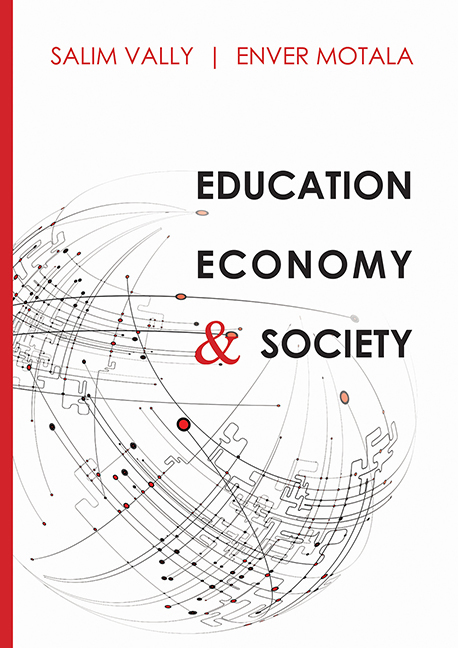Book contents
- Frontmatter
- Contents
- Foreword
- Preface
- About the contributors
- Acknowledgements
- Abbreviations and acronyms
- Chapter 1 ‘NO ONE TO BLAME BUT THEMSELVES’: Rethinking the Relationship between Education, Skills and Employment
- Chapter 2 EDUCATION AND ECONOMY: Demystifying the Skills Discourse
- Chapter 3 UNIVERSITIES AND THE ‘KNOWLEDGE ECONOMY’
- Chapter 4 GOING AROUND IN CIRCLES: Employability, Responsiveness, and the Reform of the College Sector
- Chapter 5 BUILDING A TRANSFORMATIVE PEDAGOGY in Vocational Education
- Chapter 6 SKILLS? WHAT SKILLS? JOBS? WHAT JOBS? An Overview of Research into Education/Labour Market Relationships
- Chapter 7 DEBATING THE NEXUS of Education, Skills and Technology in the Age of Lean Production: A Case Study of the ArcelorMittal Vanderbijlpark Plant
- Chapter 8 SKILLS, JOBS AND DECEPTION: Examples from the South African Workplace
- Chapter 9 ON THE USE AND ABUSE OF EDUCATION: Reflections on Unemployment, the ‘Skills Gap’ and ‘Zombie Economics’
- Chapter 10 THE YOUTH WAGE SUBSIDY in South Africa: Employment, Skills and ‘Churning’
- Chapter 11 EPISTEMIC INJUSTICE and the Struggle for Recognition: Human Dignity and the Recognition of Prior Learning
- Chapter 12 (RE)CLAIMING WORKERS' EDUCATION
- Chapter 13 SKILLS DEVELOPMENT in Post-Apartheid South Africa: Issues, Arguments and Contestations
- Index
Chapter 5 - BUILDING A TRANSFORMATIVE PEDAGOGY in Vocational Education
Published online by Cambridge University Press: 16 February 2020
- Frontmatter
- Contents
- Foreword
- Preface
- About the contributors
- Acknowledgements
- Abbreviations and acronyms
- Chapter 1 ‘NO ONE TO BLAME BUT THEMSELVES’: Rethinking the Relationship between Education, Skills and Employment
- Chapter 2 EDUCATION AND ECONOMY: Demystifying the Skills Discourse
- Chapter 3 UNIVERSITIES AND THE ‘KNOWLEDGE ECONOMY’
- Chapter 4 GOING AROUND IN CIRCLES: Employability, Responsiveness, and the Reform of the College Sector
- Chapter 5 BUILDING A TRANSFORMATIVE PEDAGOGY in Vocational Education
- Chapter 6 SKILLS? WHAT SKILLS? JOBS? WHAT JOBS? An Overview of Research into Education/Labour Market Relationships
- Chapter 7 DEBATING THE NEXUS of Education, Skills and Technology in the Age of Lean Production: A Case Study of the ArcelorMittal Vanderbijlpark Plant
- Chapter 8 SKILLS, JOBS AND DECEPTION: Examples from the South African Workplace
- Chapter 9 ON THE USE AND ABUSE OF EDUCATION: Reflections on Unemployment, the ‘Skills Gap’ and ‘Zombie Economics’
- Chapter 10 THE YOUTH WAGE SUBSIDY in South Africa: Employment, Skills and ‘Churning’
- Chapter 11 EPISTEMIC INJUSTICE and the Struggle for Recognition: Human Dignity and the Recognition of Prior Learning
- Chapter 12 (RE)CLAIMING WORKERS' EDUCATION
- Chapter 13 SKILLS DEVELOPMENT in Post-Apartheid South Africa: Issues, Arguments and Contestations
- Index
Summary
Introduction
Vocational education has been highlighted as a key vehicle in the socio-economic development of South African society and is gaining almost unprecedented prominence in government policy, plans and public debate. The importance of vocational education in post-apartheid South Africa is underscored in national skills formation policies related to the Further Education and Training (FET) sector, the National Skills Development Strategy (NSDS) as well as increases in funding. The importance of the vocational education sector has more recently been emphasised in pending policy as set out in the Green Paper for Post-school Education and Training (DHET 2012a). The key public institutions for vocational education are 50 FET colleges that accommodate 400 000 students and are staffed by 16 000 educators (DHET 2013).
The escalating interest in vocational education is driven, amongst others, by the marginal status of vocational training and the selective inclusion of students and workers in non-formal education and training programmes historically. Over the last decade, the importance of vocational education came into sharp focus as radical changes in the global economic system, combined with scientific and technological innovation and transfer, demanded new (largely formal) ways of preparing youth and adults for the labour market. The role of vocational education is increasingly attached to increasing the supply of human capital for the economy, premised on the idea that this would address the problem of higher rates of unemployment amongst the youth in South Africa (DHET 2012a; NPC 2011a). Policy development for vocational education is shifting rapidly in ways that are intended to build a closer connection between vocational education for the youth and the provision of strongly regulated, institutional pathways from school to work. This policy (as it pertains to vocational education in particular) is framed within a context of: (a) an increase in the levels of ‘formal’ unemployment above 25%; (b) a call for an 8–9% economic growth requirement set as the target for creating employment; (c) an acknowledgement of perpetual crises in education marked by fiscal constraints, teacher strikes and student unrest; (d) the relentless socio-economic struggles of the poor manifested in service delivery protests; and (e) South Africa as the society that evinces the greatest level of inequality in the world with a Gini coefficient of 0.7.
- Type
- Chapter
- Information
- Education, Economy & Society , pp. 81 - 102Publisher: University of South AfricaPrint publication year: 2014

